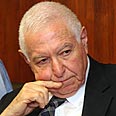
State Comptroller Micha Lindenstrauss submitted his annual report to Knesset Speaker Dalia Itzik and MK Zevulun Orlev, chairman of the State Control Committee on Tuesday morning.
Spanning 1,514 pages, the report (58b) is the most extensive ever authored by the comptroller's office and a whopping 400 pages longer than last year's.
"This is a day of jubilee for Israeli democracy. Any submission of criticism is a celebration of democracy," said Lindenstrauss, a former High Court Justice.
"The report speaks for itself," the comptroller said, "we found grave failings that require immediate attention. I am under the impression that over the past year the responsiveness towards realizing the recommendations of the comptroller's report has grown. Our reports are implemented by cabinet ministers and directors-general of government offices, and while there is still room for improvement, there has indeed been a change for the better in this respect, and much of this is due to the Knesset's activities and those of the State Control Committee."
Rehabilitation of North in shambles
In recognizing the destruction wreaked by the Second Lebanon War, the government promptly authorized the transfer of NIS 4 billion (nearly $2 billion) for rehabilitation efforts in Haifa and northern Israel – however some of the funds found their way to Gaza-vicinity communities and instead of drawing from the budget – a total of NIS 1.2 billion of the amount cited came from private donations.According to Lindenstrauss' report, the government only allocated NIS 2.8 billion ($830.6 million) for the use of northern communities seeking to rebuild. The remainder of the money was raised through donations. Furthermore, a portion of the budget was funneled to the battered Gaza-vicinity communities instead of being dedicated solely to the North.
Lindenstrauss was highly critical of the government's practice of relying on donations for matters high on its list of priorities. This, he wrote, is a crucial public service, and for the government to fail in leading the rehabilitation effort – is nothing short of unseemly.
However alongside this, the comptroller discovered, no governmental authority had any information regarding the extent of the donations being collected or where the funds had ended up.
"The project to build up the North was highly anticipated, particularly amongst residents of Haifa and the North. But the project faded and its influence is hardly felt. It should be expected that after the difficult war the North had been through, the government would harness the relevant authorities to rehabilitate the region," wrote Lindenstrauss.
Refugee Status? Wait 3 years
Between the years 2000-2007, a recorded 8,377 Africans requested Israel grant them refugee status and provide them with political asylum, most after having infiltrated Israel through Egypt. Of that number, only 109 were recognized as genuine refugees escaping persecution and granted official asylum in Israel until peace is restored to their countries.Research by the State Comptroller’s Office revealed that the processing of rejected asylum-seekers took an average of six months. Approved requests, however, took an average of 33 months.
Lindenstrauss wrote that the lengthy processing period was devastating to those truly seeking asylum as during the interim period they do not enjoy the rights given to those considered refugees. Rights such as health care and social services. Nevertheless, the time dedicated to dealing with those whose requests are rejected burdens law enforcement authorities.
According to the report, the Interior Ministry did not accept aid from the refugee governate, which had offered to assist in handling the requests. Furthermore, the comptroller wrote, the ministry also failed to examine other ways to make the process more efficient.
As for the long-debated question of which authority is meant to deal with the incoming refugees, the comptroller ruled that in accordance with legislation passed eight years ago, refugees were not to be automatically considered a danger to nation security, and that therefore after initial questioning by security forces, they should no longer be under the IDF's care but rather be handed over to civil authorities.
“Between allowing the return of Sudanese citizens to Egypt as soon as possible and not doing so, an appropriate cross-ministerial alignment is required in order to satisfy the Sudanese citizens’ needs in an array of issues, including education and health,” said Lindenstrauss.















